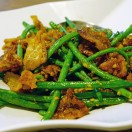"Kitchen
The first principle of Balinese cuisine is devotion. The food of the day is sacrificed daily before people eat it. Many dishes are specially prepared for ritual purposes and eaten after the ceremony - food is prayer. Fish, meat and poultry are eaten in smaller quantities as a side dish. Cows are considered sacred in the predominantly Hindu Bali, which is why beef is out of the question as an offering. Pork, on the other hand, is an everyday food and contributes with fish (fresh and sea water), seafood, goat meat, but also snails (Bekicot) to the protein supply. Ducks, which are widely used as farm animals, are also indispensable for banquets and large sacrifices. Historically, cooling possibilities were limited, so fish is often salted or processed into fish paste.
In everyday life, the communal consumption of meals is not considered to play a role of its own. The common meal is only reserved for festive days. At a festival there are also no separate courses of food. Breakfast is not infrequently a stand-up snack, where a few dishes are quickly eaten that were brought along from the visit to the market. Lunch is freshly prepared every morning by the women of the household and then stored on the dining table under a fly screen, where the family members serve themselves as they please throughout the day. Terms such as starter, soup, main course or dessert are inappropriate for Balinese cuisine. One eats what is on the table in the order of one's own taste. Dinner usually consists of the remains of lunch. Omelettes or fried noodles, which the Chinese have established in Indonesian cuisine, are also served.
Different spices occupy an important position in Balinese cuisine - as in Asia in general. Side dishes are often strongly spiced, often also extremely spicy. Balinese dishes can usually be kept all day without refrigeration. The coconut, which is one of the main cultivated products of the island, is indispensable. Its milk, prepared from an infusion of water and grated coconut, is an excellent basis for curry dishes. Grated coconuts are mixed with vegetables or fried with spices as a side dish. Indian and Arab merchants brought new spices to Bali, such as ginger, cardamom and turmeric. The Portuguese added the chillies, which are indispensable in Balinese cuisine today. Dutchmen enriched the diet with potatoes and other European vegetables that grow well in the higher altitudes of Bali. The Chinese mainly brought glass noodles to Bali.
In Bali rice is more than a staple food, because for the Balinese food is the same as eating rice. Manioc and potatoes are only served occasionally. Even the fast food chains serve all dishes with rice and only for an extra charge with French fries. A popular snack in between is rujak, a fruit salad made from unripe fruit - especially from a special mango - or vegetables, served with a sauce of chilli, palm sugar, roasted crab paste and fish sauce, seasoned with lemons and salt."

